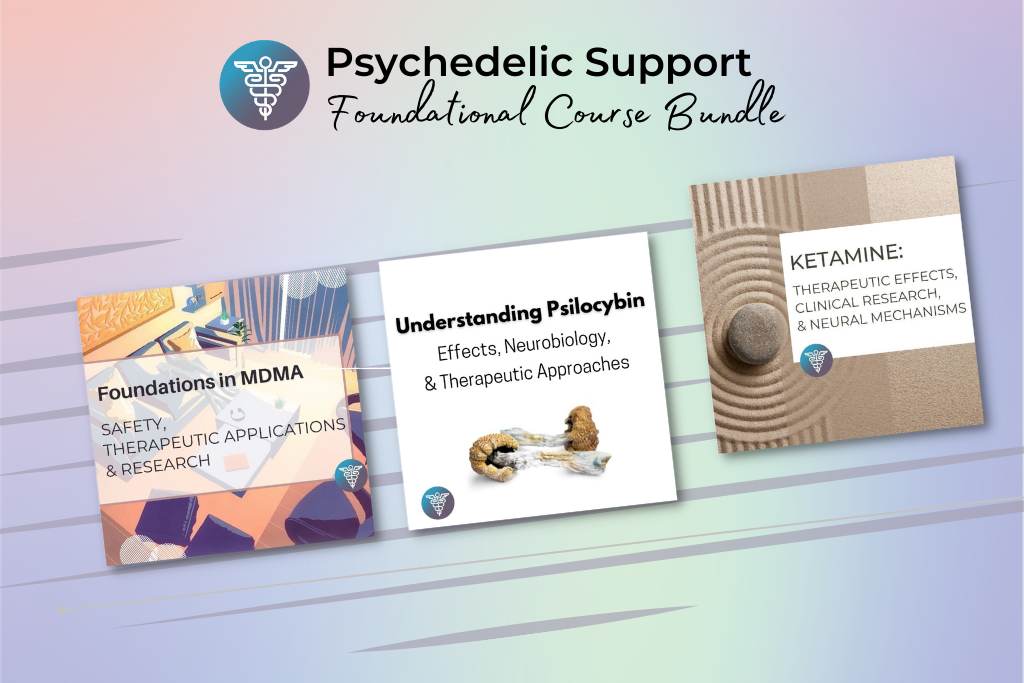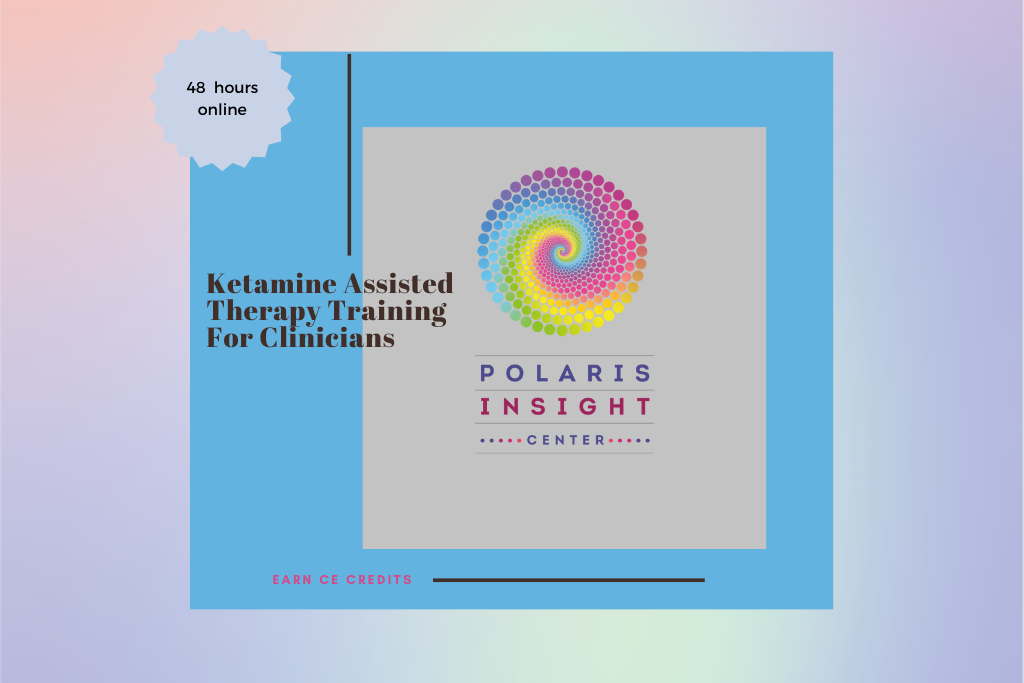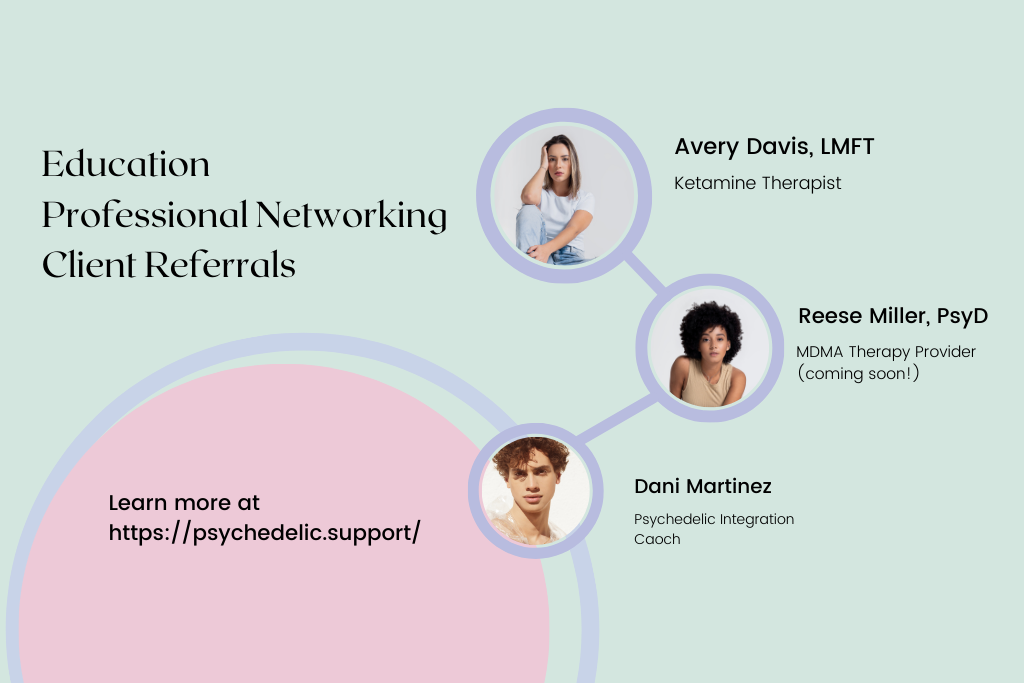At Psychedelic Support, we often get questions about psychedelic training programs and which ones are the best to enroll in. I’d like to give you information about two programs that are enrolling now for their next cohorts. Both programs are geared toward those who are looking to build the necessary skills for administering psychedelics to their clients. If you are interested in taking shorter online courses, you will find our education page helpful. There, you can explore a range of options. This ranges from free courses to affordable online courses that you can complete at your own pace, as well as live-taught workshops. Many include continuing education (CE) and continuing medical education (CME) credits for health professionals. It’s definitely worth checking out!
Should I enroll in a one-year psychedelic training program?
If you are considering a longer-form program, ask yourself these questions:
- Am I a medical or mental health professional such as a doctor, therapist, psychologist, nurse, etc.?
- Do I want to attend a fully online program, in-person, or a hybrid approach?
- What is my budget? Do I consider the program costs to be an investment in my professional career that has the potential to increase my services and grow my business financially?
- What psychedelic substances do I envision offering my clients?
There are two programs with start dates twice/year. The Integrative Psychiatry Institute (IPI) and Vital offer these programs. Both are excellent, comprehensive online programs for practitioners to learn about ketamine, MDMA, and psilocybin. Do you want a shorter 48-hour online ketamine-focused program? Check out the Ketamine-Assisted Psychotherapy (KAP) Training offered by Polaris Insight Center.
I will discuss the key differences between these programs and give you some things to consider when deciding which program is best suited for you. Please keep in mind that the Food and Drug Administration, also known as the FDA, has not approved MDMA or psilocybin as medications for mental health. Therefore, the training requirements are still up in the air.
With that being said, drug development sponsors like MAPS (now Lykos Therapeutics) and the Usona Institute will need as many trained professionals to deliver MDMA and psilocybin therapy if the FDA approves it. They will collaborate with training programs to streamline certifications for those who have undergone training. On the other hand, the state of Oregon has already established regulatory requirements for the training and licensure of facilitators to offer psilocybin in Oregon-certified centers.
IPI vs Vital Psychedelic Training Programs
Let’s compare the IPI and Vital psychedelic training programs. First off, to enroll in the IPI program, you must have an advanced degree in either medicine or mental health. The training is designed for therapists, doctors, nurses, and other health professionals to administer psychedelic-assisted therapies in their practices. Enrollment into the Vital program is open to health providers, as well as other healing professionals like coaches. No licensure or prerequisites are required. Both programs are great for professional networking.
IPI enrolled its sixth cohort in January 2024. Since it launched in 2021, about 1600 students have gone through it. Cohorts for the one-year, 256-hour training program start in January and July of each year. They anticipate 300-400 students in each cohort. This is made up of about 10 students per home group and 3 to 4 students in small group breakouts during the seminars. 90% of the program is live-taught online. To learn more and apply, they offer a complimentary call to eligible students.
Vital has served two cohorts since its launch in 2022. Over 300 students have gone through the program as of the end of 2023. Cohorts for the 180-hour program start in January and September. There are about 100 students in each cohort and 15-20 students in the small group activities. Again, you do not need to have a graduate degree or medical licensure. They evaluate students’ applications based on a number of factors. These are their previous professional and personal experiences, the extent to which they are committed to inner work and self-awareness, and how open they are to multidisciplinary frameworks for developing knowledge and skills. They prioritize students committed to diversity and inclusion and whose involvement in Vital will maximize positive benefits to their local communities. There is a non-refundable $75 application fee.
Shared Features and Accreditation
Both programs have an extensive guest faculty of notable researchers, therapists, and industry experts. The co-founder of IPI, Dr. Will Van Derveer, is an integrative psychiatrist. Will worked on MAPS MDMA therapy trials for PTSD for several years and brings these learnings into the frameworks taught. The founders of Vital are one and the same as Psychedelics Today, a long-standing platform of public education. Both IPI and Psychedelics Today have podcasts you can listen to for a better sense of these programs’ organizers. The trainings consist of webinars, break-out groups, and electives. Additionally, the Vital program includes a personal project to help students integrate what they have been learning over the year.
Both programs offer continuing education credits for professionals for qualifying content. All students receive a certificate of completion at the end of the program. The Oregon Health Authority has approved IPI to certify students who complete the core online competencies and attend a mandatory in-person retreat. Vital does not yet have Oregon approval but students may possibly receive credit in the future. Currently, no national board certification exists for psychedelic-assisted therapy, and further requirements are pending FDA approval.
Psychedelic Training Program Costs
The IPI psychedelic training program costs $10,000, with discounted early bird pricing offered at $7,000. This price includes the core online, one-year program. Participants are invited to optional in-person experiential retreats in Boulder, Colorado, to experience ketamine, priced at $1500 plus travel and accommodations, and $3,000 for a psilocybin retreat in Eugene, Oregon.
Vital’s core program costs $10,500 ($2,000 discount early bird registration), and they require one in-person retreat for an additional $2,500 to $4,500 plus travel and lodging. Both programs have payment plans and a limited number of scholarships for those in need of financial assistance. Investing in your career is always a wise decision. Even though these programs may seem expensive, they can ultimately support your professional and financial goals in the long run. If you plan on offering psychedelic services, it’s important to consider the value of these programs as an investment in your future success.
Psychedelic Career Opportunities
Completing these programs can open up several career opportunities related to psychedelic preparation and integration. Depending on your profession and state of residence, you may even be able to administer ketamine therapy, which is legally available in all states as a prescription medicine. In Oregon, completing the IPI program would allow you to offer psilocybin in certified centers.
If other psychedelic medicines become FDA-approved in the future, you will be able to add these to your practice pending completion of any additional FDA-mandated training requirements. It is important to note that as interest in these programs increases with state or federal approvals, it may become more difficult to secure a place in these comprehensive programs.
We have heard from a number of students who have completed these programs, and all say they got a lot of them and feel prepared to take the next steps to advance their psychedelic careers. You can learn more about each program here:
- Integrative Psychiatry Institute (IPI) psychedelic training program
- Vital psychedelic training program
We wish you well in your education journey! And if you aren’t ready to sign up for a full-year program, I highly recommend our online courses here at Psychedelic Support.








